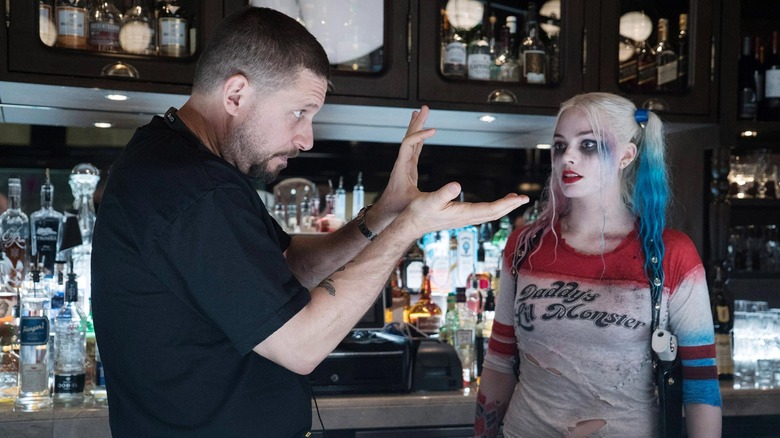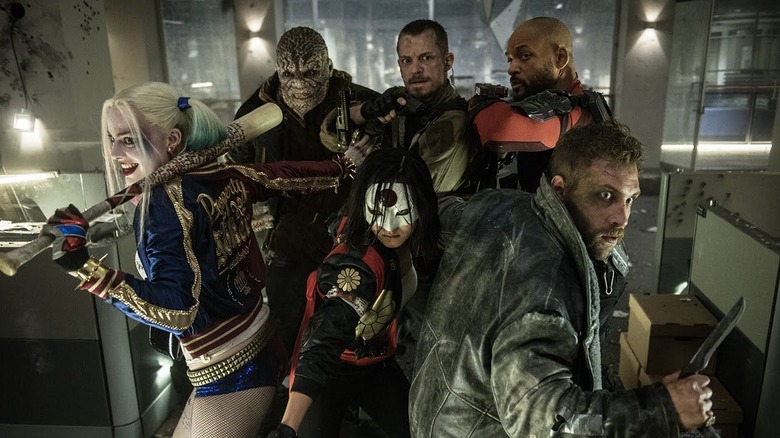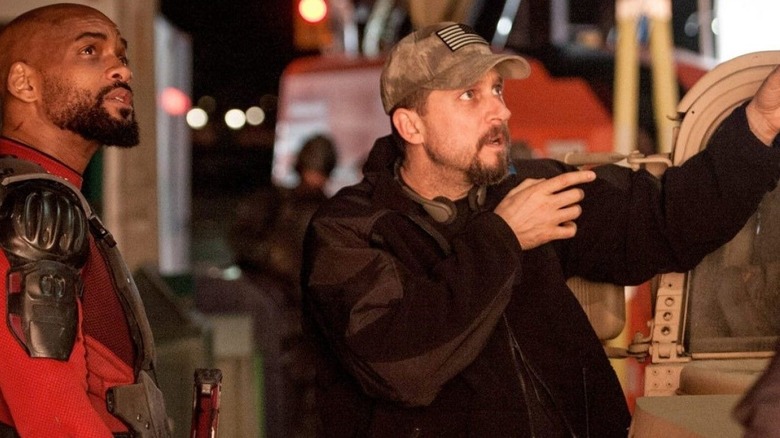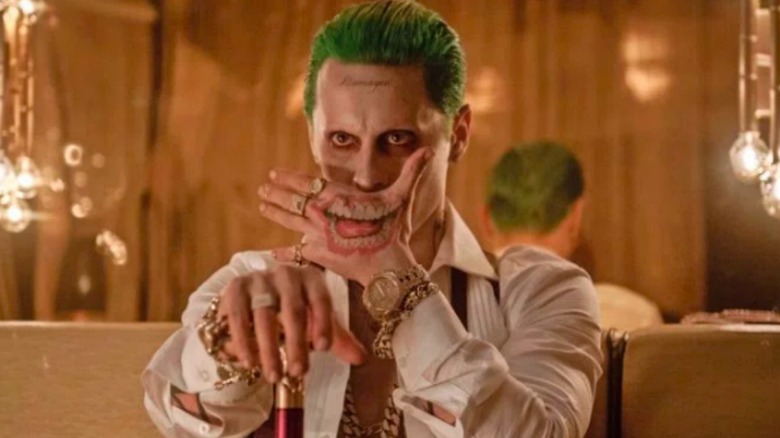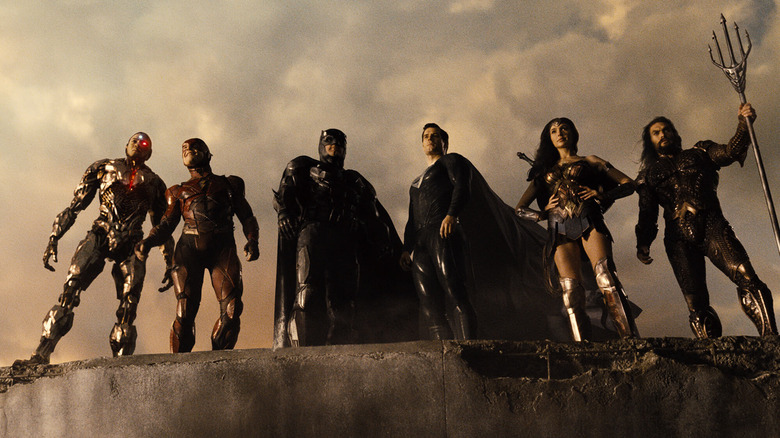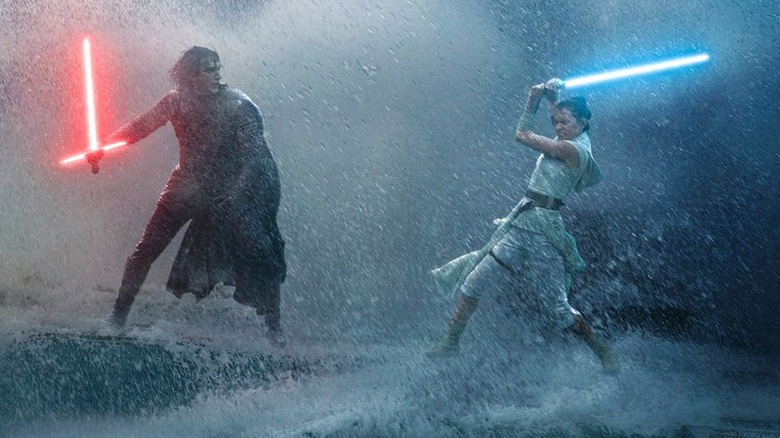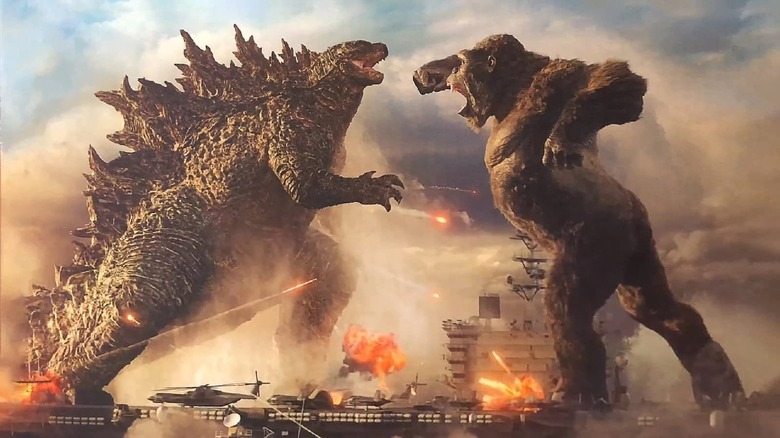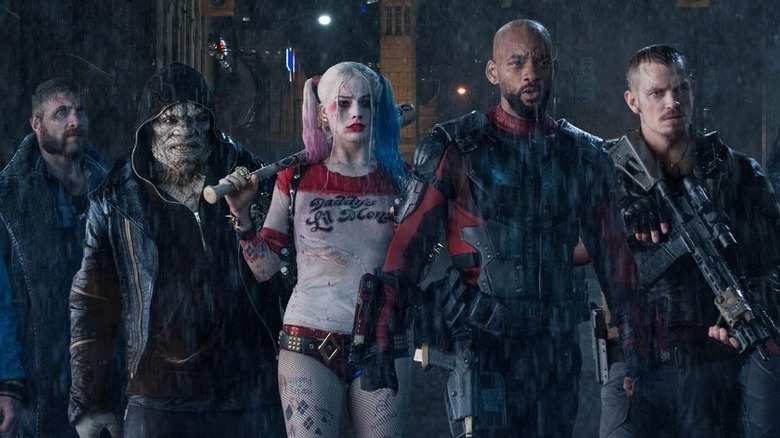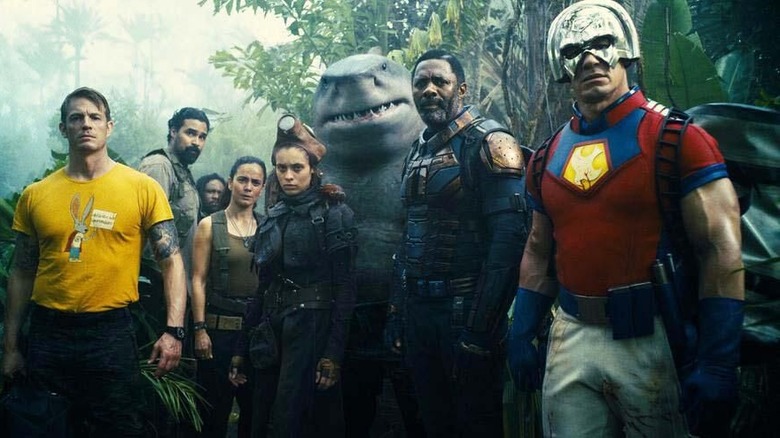Releasing The Ayer Cut: Or, Why Giving The Fans What They Want Isn't Actually A Good Idea
David Ayer has been very vocal about his disappointment with the release of 2016's "Suicide Squad," a film he was only given six weeks to write and one that received a flurry of highly publicized re-shoots after "Batman v Superman: Dawn of Justice" was nailed by critics and audiences for being "too somber." Warner Bros. decided that Ayer's cut of "Suicide Squad" was too dark, and instead wanted the film to resemble the lighthearted and comedic energy delivered by the film's trailers. Warner Bros. spent an approximate $22 million in re-shoots, and according to Ayer, the film that ended up on screen was almost unrecognizable compared to what he had delivered.
Critics hated "Suicide Squad" despite the film's $747 million worldwide box office earnings, but fans, and David Ayer himself, have been pushing for Warner Bros. to release Ayer's original cut of "Suicide Squad" ever since news broke that HBO Max would be the exclusive home to the "Zack Snyder's Justice League" (remember #ReleaseTheSnyderCut?), the version of "Justice League" that director Zack Snyder had intended to make but was unable to fulfill after leaving the production following the loss of his daughter. Joss Whedon was brought in to complete the project, but the final product was not the same as what Snyder had envisioned. Considering the extenuating circumstances surrounding his departure, a massive fan campaign was sparked in the hopes of DC fans getting to see the movie as originally intended. This motivated Ayer and fans to push for similar treatment, but WarnerMedia Studios has already stated they "won't be developing David Ayer's cut" of "Suicide Squad."
Why? 🥺 https://t.co/0oJrRv54Av
— David Ayer (@DavidAyerMovies) March 22, 2021
Why Won't Warner Bros. Release Ayer's Cut?
Ayer has personally noted that his director's cut of the film exists, but after WarnerMedia Studios CEO Ann Sarnoff's definitive statement about it not happening, it seems the #ReleaseTheAyerCut campaign is futile. That hasn't stopped Ayer or his rabid fanbase from trying. While Warner Bros. hasn't given an on-record reason for not releasing the film, there are a multitude of reasons in WB's defense. Perhaps the biggest reason they won't pursue unleashing Ayer's "Suicide Squad" cut is because James Gunn's sequel "The Suicide Squad" was released in 2021 to critical acclaim and a ton of fan love, even inspiring the upcoming spin-off series, "Peacemaker." It also killed off a lot of the cast featured in Ayer's film.
There's no real benefit for Warner Bros. to go back and release the cut of a film whose story has already progressed, especially when the released cut not only scored them a massive payday, but also earned an Academy Award (for its make-up effects). Sarnoff justified the decision to release the Snyder Cut as a way to complete his trilogy, but noted "We're very happy we've done this, but we're very excited about the plans we have for all the multi-dimensional DC characters that are being developed right now."
How Does Ayer Really Feel?
The reshoots Warner Bros. made for "Suicide Squad" were not a secret, but upon the film's release, Ayer defended the theatrical cut and claimed it as his own. "This cut of the movie is my cut, there's no sort of parallel universe version of the movie, the released movie is my cut," he said in an interview with Collider. That interview was shortly after the film's release, however, where directors aren't usually willing to tell the full truth about their experience in production. After this year's release of James Gunn's "The Suicide Squad" far surpassed the critical response of his own film, Ayer took to Twitter to deliver a biting essay completely slamming the film he had previously defended as his own.
My turn… https://t.co/E5uumAwvdp pic.twitter.com/ckr9kzeGFD
— David Ayer (@DavidAyerMovies) July 29, 2021
"The studio cut is not my movie. Read that again," he said. His response echoes that of director Josh Trank who behaved similarly in regard to "Fantastic Four," where he initially played the game of Hollywood pleasantries before doing his best to completely distance himself from the world. Studio meddling isn't anything new, but if Warner Bros. had any inclination to release Ayer's cut of "Suicide Squad," his impassioned rant was the final nail in the coffin.
How Does The Cast Feel About It?
Jared Leto, who played The Joker in "Suicide Squad," has been arguably the most vocal supporter of the release, likely because his character received some of the biggest cuts from the final product. When asked about the Ayer Cut at the premiere of "House of Gucci" (because anytime an actor is involved in a superhero property it is brought up no matter what other project they're promoting) Leto said, "Why wouldn't they? I mean, that's what streaming's for, right?" Ayer agreed with him, taking to Twitter to once again discuss the matter, despite his previous essay claiming that he'd no longer talk about the situation publicly.
Exactly what streaming is for. If you own IP and you have a mandate to monetize it from your shareholders that’s exactly what you do 💁🏻â€♂️ @ATT https://t.co/4NRC4oF1Di
— David Ayer (@DavidAyerMovies) November 19, 2021
John Cena, who appears in James Gunn's "The Suicide Squad," took the Miss America approach, stating "It's in a company's best interest to listen to their audience, and if it's something that's so in demand and they got it, why not?" Margot Robbie, who plays Harley Quinn in both "Suicide Squad" films, called the situation "complicated," but admitted she would want to see every cut of every movie she's been a part of:
The funny thing is that when you're an actor — not when you're a producer — as an actor, sometimes I don't see it until half the country has seen it. You don't really get to see the different iterations along the way unless you're a producer.
It's totally understandable for an actor to want to see all versions of their work, but these statements are less of an endorsement and more of a "maintain a positive response as to not upset Ayer or Warner Bros."
The Ayer Cut isn't Financially Viable
Additionally, the Snyder Cut of "Justice League" wasn't exactly the financial powerhouse anyone likely anticipated. Sure, the promise of the film's availability spiked HBO Max subscription numbers by 64%, but Warner Bros. had to shell out an additional $70 million in reshoots. While Ayer's new cut wouldn't possibly cost nearly as much, any post-production work from needed from his deliverables to Warner Bros. will still cost something.
In general, director's cuts are only released as a way for studios to make additional money off of their existing IP. By and large, people who don't like a movie aren't going to magically be convinced to revisit the story just because a new cut of the film exists. There's no financial gain to be had for Warner Bros. to release Ayer's cut. "Justice League" was a way to honor the horrific circumstances surrounding Snyder's departure, but let's call it for what it is: releasing the highly-anticipated film was also a great way to inspire people to subscribe to HBO Max. The reality is that the same people pleading for the Ayer Cut are likely the same people who begged for the Snyder Cut, and Warner Bros. already has their subscription numbers and dollars.
Being A Huge Fan Doesn't Qualify Someone To Make Creative Decisions
Imagine it's Super Bowl Sunday and your favorite team is playing. Chances are, you and everyone else in the room has been watching this team for years. You know all of the players' strengths and weaknesses, and your home and wardrobe is filled with signs of your dedication to the team. Suddenly, you look at the screen, and your favorite team is losing. What happens? You shout at the screen. You insult the coach's intelligence. You and everyone in the room start debating over what plays they should run to overcome the odds and win the game. Sure, you might have some really great ideas, but ultimately, you're not the coach, you're a spectator, and screaming at the television screen is not going to change the course of the game.
But now that Twitter gives fans a direct connection to their favorite creators, everything has changed. Sometimes, vocal fan outrage can work for good, like Sonic getting a redesign to something less nightmare-inducing or saving shows like "Brooklyn Nine-Nine" and "Chuck." Unfortunately, these fan campaigns don't always come with good intentions. Sometimes, these campaigns are guided by a singular view of entitlement at best (like with the complaints surrounding "Star Wars: The Last Jedi" influencing the giant fan film known as "Star Wars: The Rise of Skywalker"), and straight-up perpetuation of bigotry at worst.
Unfortunately, It Sets a Dangerous Precedent
#ReleaseTheSnyderCut was a success in the sense that a movie was made, but the toxic fan culture that came with it absolutely tarnished any success the movie had. Allowing for the release of the film opened the floodgates, with fans getting louder and more vicious in an attempt to have their demands met. "Snyderbros" review-bombed "Godzilla vs. Kong" in retaliation of Warner Bros. decision not to make additional DC superhero movies from Zack Snyder.
Sarnoff certainly doesn't have the patience for this brand of "fandom" saying:
We're not tolerating any of that. That behavior is reprehensible no matter what franchise you're talking about or what business you're talking about. It's completely unacceptable. I'm very disappointed in the fans that have chosen to go to that negative place with regard to DC, with regard to some of our executives. It's just disappointing because we want this to be a safe place to be. We want DC to be a fandom that feels safe and inclusive. We want people to be able to speak up for the things they love, but we don't want it to be a culture of canceling things that any small faction isn't happy with. We are not about that. We are about positivity and celebration.
We Don't Negotiate with Terrorists
Completely putting aside the tragic situation that caused Snyder to leave the project and therefore allowing for a complete justification for wanting to give him the space to create the film that was ultimately taken from him for reasons beyond his control, the #ReleaseTheSnyderCut campaign was overwhelmingly not operating from a place of empathy for the director, but instead fan entitlement. The release of Snyder's "Justice League" was not viewed as a success for the director in their minds, but instead vindication for their extremely loud and downright cruel fanbase. The day HBO announced the film would be released, there were less excited comments about what this means for Snyder and his story, instead replaced by a flood of fans exclaiming, "We did it!" This was proof that if you complain enough and harass enough people, you can get whatever you want, and that's dangerous.
Fans obviously have a right to complain when something they love misses the mark (See: the final season of "Game of Thrones,") but a distinct line is crossed when the disappointment or critique becomes a rallying cry for an entire fanbase. Look at what happened with films like "Black Panther" and "Captain Marvel," which were review bombed by racist and misogynist superhero fans so badly, Rotten Tomatoes had to completely change their score system, or Netflix who removed their star-rating after people review bombed Amy Schumer's comedy special simply because angry fanboys felt like it. Releasing the Ayer Cut would be caving into the demands of a group of people who should be reprimanded, not rewarded.
It's Time To Move On
Not every movie is going to be exactly what the viewer wants or what the director had in mind, and that's just the way the cookie crumbles. Filmmaking is a collaborative medium, and no one person is responsible for the success or failure of a film. However, constantly bending to the wills of fans or very loud directors online is only perpetuating the already vanishing line between creator and consumer. We already have algorithms telling us what to watch and telling studios how to design a poster, who to cast, and what stories are "worth" telling, and allowing projects to be held hostage by angry fans only exacerbates the situation.
It's hard, but it's time for fans to move on. Warner Bros. isn't going to make the Ayer cut, and harping on it is only going to dissuade others from wanting to work with him in the future because they're not going to want to deal with the guaranteed baggage of a toxic fandom screaming at them every second of every day. If fans truly care about Ayer, they'll knock it the f*** off. There's definite empathy to be had for Ayer, who won't get to show his cut of "Suicide Squad" to the world en masse, but continuing to kick and scream like a petulant toddler who didn't get the toy they wanted for their birthday is not behavior that deserves encouragement, and certainly is the furthest possible thing from heroic.
